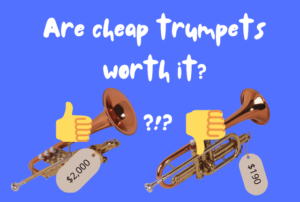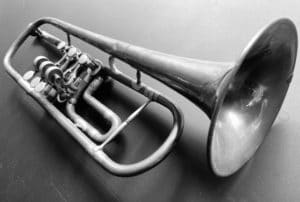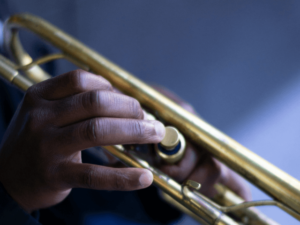So, either you just started getting on the track, or maybe you’ve been playing for what it seems like a lifetime. Either way, if you intend to have a good sound, a professional trumpet is an absolute must.
The trumpet is truly a timeless instrument and has the highest voice in the brass family. There are many different varieties including the cornet, flugelhorn and specialty options such as the piccolo trumpet, which is widely used in symphony orchestras and chamber ensembles.
In general, there are three levels of a trumpet: student, intermediate and professional quality trumpet. But when you decide to purchase an instrument, you’ll surely ask yourself: Should I buy a student level trumpet? Or should I upgrade to an intermediate level or a professional trumpet?
Choosing a Trumpet
It is important to remember that any truly focused student will need a professional-level trumpet sooner or later in order to stay ahead of his or her peers, particularly if the student is highly competitive or keen to pursue music personally.
This is why, for a student who is practicing seriously and with dedication within the first two or three years, an intermediate trumpet is usually not recommended – at least not if a professional trumpet is an option. You’ll need it sooner or later anyway, and this will save you the trouble of reselling a used instrument. So go for the best, unless a professional trumpet is out of the question for financial reasons.
Beginner Trumpet vs. Intermediate Trumpet
First things first, student trumpets are specifically designed for players who are new to the instrument. These beginner-level instruments are constructed to be both economical and durable for use and often include features that make them easier and more fun for new students to play.
Student trumpets can perform very well but lack some of the higher-end features and construction seen in intermediate and professional models. The smaller bore on a student-level trumpet makes it easy to get a full sound from the trumpet without requiring too much effort.
Looking for a teacher?
Want to get lessons at the comfort of your own home? Check out the course Learn to Play the Trumpet: Beginner to Pro Made the Easy Way* on Udemy! (See their full trumpet course line-up here*!)
More advanced students might find beginning-level trumpets to be limiting. Intermediate trumpets are a good choice for those looking for an upgrade after the first couple of years. An intermediate trumpet usually has more resistance in the upper register to prevent the player from over-blowing and ruining their chops.
As such, trumpet makers design intermediate-level trumpets that incorporate some advanced features to help developing players get a richer sound from their instruments, without having to spend in a full-featured professional model.
Why Do You Need a Professional Trumpet?
Professional trumpets are constructed using the finest materials, employing careful craftsmanship, and keeping a seasoned performer’s needs in mind. These horns typically have a one-piece bell, stainless steel pistons and can be either heavy or lightweight.
Seasoned players looking for the best in tone and responsiveness will want to look for masterfully crafted instruments. If you plan to play the trumpet at an advanced level for a significant period of time, a professional level instrument is an excellent investment.
Professional-level trumpets like a Bach Stradivarius* or a Yamaha Xeno* run in the neighborhood of $2000 and more, so even though you can still get good money for a pre-owned model, make sure you think twice before buying one so you are certain it will be worth the investment.
What Makes A Professional Trumpet?
Professional quality horns are made to meet demands of professional players. The materials are better, the construction is more precise, the designs are more tested and scientifically sound. The options are extensive and can be overwhelming.
Though a bit oversimplified, the finish and color of beginner to intermediate trumpets are typically brass, while professional trumpets are usually silver, and for the high-end trumpets, gold.
Pro quality trumpets differ from each other primarily in weight, bore size (diameter of the tubing), and bell size, material, and shape. There are many variables to consider, too, especially the age and experience of the player.
Wind instruments like the trumpet and other brass instruments require a relatively high level of physical maturity and strength to produce a good sound, which is why there are virtually no very young child prodigies of such instruments.
That being said, a talented, dedicated player will more likely be hindered by a trumpet of lesser quality. A student who displays both ability and commitment should have access to a professional-level trumpet as soon as the budget allows for it.
Pro horns are all versatile instruments. They would no doubt meet all the demands you could place on them throughout high school, college or community band and orchestra. The difference in horns is minimal compared to the differences in players, so you might want to try a few different ones and see which one you like best.
If you get a pro horn, you won’t be able to blame any poor playing on your instrument any longer! There may be some subtle differences in tone quality and intonation that might be heard by attentive listeners, but most of the differences is in flexibility, response, and ease of use that are better felt by the player than heard. The best horn for you is the one that makes it easiest to produce the sound you hear in your head.
Decision Time
At the end of the day, which horn is right for you comes down to personal preference, especially regarding professional instruments. Go out and play a bunch of horns. You don’t want to make a bad decision, so give yourself as many options as possible. Test as many trumpets as you can before making a final selection. You should be able to test trumpets before you buy them at your local music store. The one that sounds the best, feels the best, and the one that suits your style and budget is the one to buy.
Related Articles
- The 5 Best Online Resources and Lessons for Beginner Trumpet Players
- The Difference Between a Bach 37 and 43 (EXPLAINED!)
- How to Fix Sticky Trumpet Valves & Other Common Problems
TrumpetHub.com is a participant of the Amazon Services LLC Associates Program, an affiliate advertising program. Links marked with an asterisk (*) are affiliate links. If you buy a product through an affiliate link, we will get a small commission without extra cost to you. This helps us earn an income off the free content we provide to you. Thank you for your support!
Featured image by Wim van ‘t Einde on Unsplash.







